Welcome to UNC Charlotte's Primate Behavioral Ecology Lab!
Our lab acknowledges and stands in solidarity with those who are fighting all forms of racism, sexism, ablism, homophobia/transphobia, the unlawful killings of Black people across the US, systemic racism, institutionalized violence,and inequities both inside and outside academia. We strive to make primatology and other areas of anthropology safe and supportive for all people, but especially BIPOC and LGBTQ+ researchers. As primatologists engaging with professionals from different cultures across the world, we see this as an opportunity to facilitate conversations between different groups and to bolster the participation of habitat-country researchers in an effort to decolonize primate conservation.
The Primate Behavioral Ecology and Conservation Lab at UNC Charlotte focuses on spatial ecology and vocalizations of nonhuman primates. While much of our work to date involves the white-handed gibbons living in Huai Kha Khaeng Wildlife Sanctuary in western Thailand, students have also worked with captive populations at US-based facilities including the International Primate Protection League, the Lemur Conservation Foundation's Myakka City Lemur Reserve, and the Duke Lemur Center.
The Primate Behavioral Ecology and Conservation Lab at UNC Charlotte focuses on spatial ecology and vocalizations of nonhuman primates. While much of our work to date involves the white-handed gibbons living in Huai Kha Khaeng Wildlife Sanctuary in western Thailand, students have also worked with captive populations at US-based facilities including the International Primate Protection League, the Lemur Conservation Foundation's Myakka City Lemur Reserve, and the Duke Lemur Center.
Who's Who in the Lab
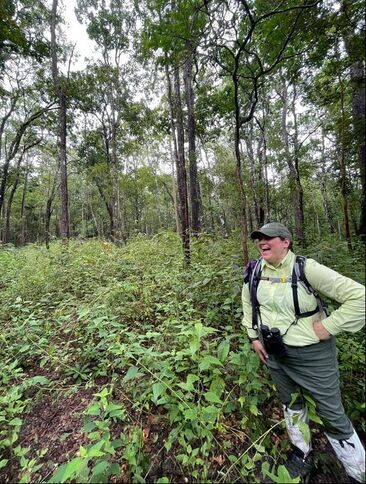
Primary Investigators
Dr. Lydia E. O. Light
My research interests focus on the behavioral ecology of living primates, examining the ecological and biological factors that may have influenced life in our own deep evolutionary past. I am interested in exploring ecological explanations for within-species behavioral and dietary variation as well as the evolution of pair-bonds and pair-living social systems. For my dissertation, I combined behavioral data collection techniques with remote sensing and GIS methods to examine how gibbons, small Endangered apes living in Southeast Asia, cope with challenging ecological conditions through modifications in ranging behavior, diet, and social behavior. My earlier work has examined nutritional stress during pregnancy and lactation and mother-infant interactions in captive baboons. Currently, I lead an ongoing project examining ways in which gibbons living in savannah environments alter their social and dietary behaviors to cope with difficult ecological conditions. I am specifically interested in the interrelated nature of pair bonds, territoriality, and oxytocin in this population. As climate models predict an expansion of these savannah environments, I hope to understand how these animals may adapt to rapidly changing environments both here and in other areas of the species' range.
Dr. Lydia E. O. Light
My research interests focus on the behavioral ecology of living primates, examining the ecological and biological factors that may have influenced life in our own deep evolutionary past. I am interested in exploring ecological explanations for within-species behavioral and dietary variation as well as the evolution of pair-bonds and pair-living social systems. For my dissertation, I combined behavioral data collection techniques with remote sensing and GIS methods to examine how gibbons, small Endangered apes living in Southeast Asia, cope with challenging ecological conditions through modifications in ranging behavior, diet, and social behavior. My earlier work has examined nutritional stress during pregnancy and lactation and mother-infant interactions in captive baboons. Currently, I lead an ongoing project examining ways in which gibbons living in savannah environments alter their social and dietary behaviors to cope with difficult ecological conditions. I am specifically interested in the interrelated nature of pair bonds, territoriality, and oxytocin in this population. As climate models predict an expansion of these savannah environments, I hope to understand how these animals may adapt to rapidly changing environments both here and in other areas of the species' range.
Graduate Students

Sarah Dameron
I am a second-year student in the MA program in Anthropology at UNC Charlotte. I graduated with my Bachelor’s in Biological Anthropology from William Peace University in 2013. After graduating, I took graduate courses through a non-degree studies program in forensic anthropology, osteology, statistics, biology, and primatology while working as an Anthropology tutor and Biological Anthropology lab assistant. I decided to pursue an education in primatology in part because I was able to volunteer and work as a Husbandry Intern with the Duke Lemur Center. I am interested in primate conservation and vocalizations, and am currently working on my Master’s thesis, titled “The effects of meteorological variables on the great calls of white-handed gibbons (Hylobates lar) in Western Thailand."
I am a second-year student in the MA program in Anthropology at UNC Charlotte. I graduated with my Bachelor’s in Biological Anthropology from William Peace University in 2013. After graduating, I took graduate courses through a non-degree studies program in forensic anthropology, osteology, statistics, biology, and primatology while working as an Anthropology tutor and Biological Anthropology lab assistant. I decided to pursue an education in primatology in part because I was able to volunteer and work as a Husbandry Intern with the Duke Lemur Center. I am interested in primate conservation and vocalizations, and am currently working on my Master’s thesis, titled “The effects of meteorological variables on the great calls of white-handed gibbons (Hylobates lar) in Western Thailand."
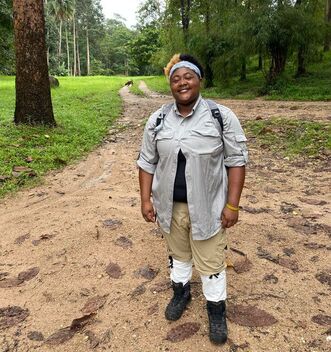
Madeja Rheddick
Hello! I am a grad student at the University of North Carolina at Charlotte. I received my bachelor degree in anthropology with a minor in sociology here in 2021. My first field experience was with Dr. Light's Primate Behavioral Ecology course at the Lemur Conservation Foundation in 2020. This course opened my eyes and taught me so much In the span of 1 week, I was then able to apply these techniques in my most recent international field experience in Thailand. During my time here and the multiple awesome interactions I have experienced, my goals and expectations have changed dramatically, my goal right now is to become a research technician an to be able to use and effectively apply techniques I have learned over time.
Hello! I am a grad student at the University of North Carolina at Charlotte. I received my bachelor degree in anthropology with a minor in sociology here in 2021. My first field experience was with Dr. Light's Primate Behavioral Ecology course at the Lemur Conservation Foundation in 2020. This course opened my eyes and taught me so much In the span of 1 week, I was then able to apply these techniques in my most recent international field experience in Thailand. During my time here and the multiple awesome interactions I have experienced, my goals and expectations have changed dramatically, my goal right now is to become a research technician an to be able to use and effectively apply techniques I have learned over time.
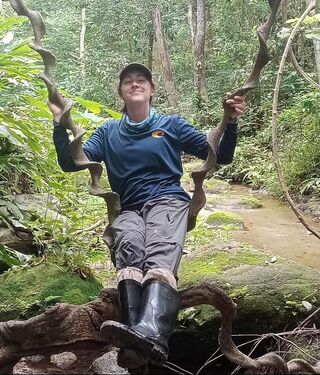
Kristen Stout
I am a second-year graduate student in the MA Anthropology program. I graduated from UNCC in 2015 with a BS in Biology. Before returning to UNCC as a graduate student, I gained experience as a field assistant studying black howlers in Chiapas, Mexico, worked as a geochemical analyst, and received Zoological training in Innsbruck, Austria. As a Biologist, I was most fascinated by behavioral phenomena across the animal kingdom. As an Anthropologist, I now am equipped with a wider range of flexible frameworks, not only useful for investigating behavior, but for considering broader implications of research on habitat communities as well. Anthropological approaches in research can facilitate moderating solutions between conservation goals and local human communities. For my MA thesis, I chose to analyze white-handed gibbon sleeping tree selection. Both predator avoidance and resource proximity are thought to influence sleeping tree selection. The gibbons of HKK are thus an intriguing community for studies of sleeping tree selection and pre-sleep behavior since they must cope with both a thriving predator community and resource scarcity.
I am a second-year graduate student in the MA Anthropology program. I graduated from UNCC in 2015 with a BS in Biology. Before returning to UNCC as a graduate student, I gained experience as a field assistant studying black howlers in Chiapas, Mexico, worked as a geochemical analyst, and received Zoological training in Innsbruck, Austria. As a Biologist, I was most fascinated by behavioral phenomena across the animal kingdom. As an Anthropologist, I now am equipped with a wider range of flexible frameworks, not only useful for investigating behavior, but for considering broader implications of research on habitat communities as well. Anthropological approaches in research can facilitate moderating solutions between conservation goals and local human communities. For my MA thesis, I chose to analyze white-handed gibbon sleeping tree selection. Both predator avoidance and resource proximity are thought to influence sleeping tree selection. The gibbons of HKK are thus an intriguing community for studies of sleeping tree selection and pre-sleep behavior since they must cope with both a thriving predator community and resource scarcity.

Halle Hangen
I am a first-year MA student here at UNCC. I graduated from the University of Rochester in 2022 with a B.S. in Brain and Cognitive Sciences and a minor in Anthropology, and I worked abroad at the German Primate Center for a year before starting graduate school. I have lab experience studying cognition and neuroscience in marmoset monkeys, and field experience in conservation with a myriad of species. I am excited to develop my skills and knowledge of primate behavior through my coursework and in Dr. Light's lab, and will pursue an endocrinology- and genetics-based project on White-Handed Gibbons in Thailand this coming summer.
I am a first-year MA student here at UNCC. I graduated from the University of Rochester in 2022 with a B.S. in Brain and Cognitive Sciences and a minor in Anthropology, and I worked abroad at the German Primate Center for a year before starting graduate school. I have lab experience studying cognition and neuroscience in marmoset monkeys, and field experience in conservation with a myriad of species. I am excited to develop my skills and knowledge of primate behavior through my coursework and in Dr. Light's lab, and will pursue an endocrinology- and genetics-based project on White-Handed Gibbons in Thailand this coming summer.
Austin Butler
Lab Volunteers
Former Lab Members
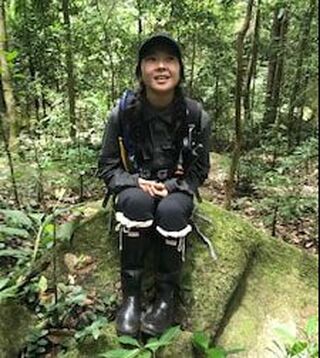
Maggie Sobaszek
Maggie received her BA in Anthropology in 2017 and completed her MA in Anthropology in 2019, both here at UNC Charlotte. Her MA thesis research was conducted at Khao Nang Rum Wildlife Research Station in Huai Kha Khaeng Wildlife Sanctuary in western Thailand and evaluated the appropriateness of several commonly used home range estimation methods with the wild white-handed gibbons at the site. Maggie is interested in how animals occupy and use space and how these behaviors impact conservation efforts for Endangered and Critically Endangered wildlife under rapidly changing ecological conditiions.
Maggie currently works as an assessment coordinator for the UNC Charlotte Office of Sustainability.
Maggie received her BA in Anthropology in 2017 and completed her MA in Anthropology in 2019, both here at UNC Charlotte. Her MA thesis research was conducted at Khao Nang Rum Wildlife Research Station in Huai Kha Khaeng Wildlife Sanctuary in western Thailand and evaluated the appropriateness of several commonly used home range estimation methods with the wild white-handed gibbons at the site. Maggie is interested in how animals occupy and use space and how these behaviors impact conservation efforts for Endangered and Critically Endangered wildlife under rapidly changing ecological conditiions.
Maggie currently works as an assessment coordinator for the UNC Charlotte Office of Sustainability.
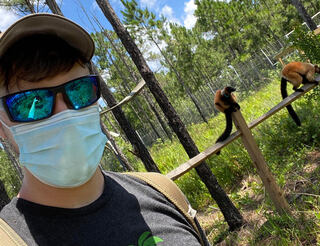
Philip Corbett
Phil received his BA in Anthropology in 2019 and his MA in Anthropology in 2021, both here at UNC Charlotte. His MA thesis research focused on captive lemur parasitology. Outside of his research, Phil has interests in conservation, human/animal disease transfer, and nocturnality. His first field experience was during the summer of 2018 when he assisted Dr. Lydia Light with her gibbon research in Thailand. He went on to serve as Dr.Light's TA for both the 2019 Thailand field school and the 2020 LCF field school.
Phil currently works for the Piedmont Research Station supporting crop and livestock research.
Phil received his BA in Anthropology in 2019 and his MA in Anthropology in 2021, both here at UNC Charlotte. His MA thesis research focused on captive lemur parasitology. Outside of his research, Phil has interests in conservation, human/animal disease transfer, and nocturnality. His first field experience was during the summer of 2018 when he assisted Dr. Lydia Light with her gibbon research in Thailand. He went on to serve as Dr.Light's TA for both the 2019 Thailand field school and the 2020 LCF field school.
Phil currently works for the Piedmont Research Station supporting crop and livestock research.

Zachary Burgen
Zak worked as a lab volunteer while studying operations and supply chain management with a minor in anthropology here at UNC Charlotte. Together with Jessica Jacobs, Zak analyzed gibbon vocalizations and presented their results at the annual meeting of the American Association of Biological Anthropologists in 2021.
Zak is now attending dental school.
Zak worked as a lab volunteer while studying operations and supply chain management with a minor in anthropology here at UNC Charlotte. Together with Jessica Jacobs, Zak analyzed gibbon vocalizations and presented their results at the annual meeting of the American Association of Biological Anthropologists in 2021.
Zak is now attending dental school.

Jessica Jacobs
Jessica coauthored a vocal analysis of the great calls of white-handed gibbons at UNC Charlotte. She is currently working alongside Dr. Charles Egeland and Dr. Robert Anemone of the University of North Carolina at Greensboro on a 3D modelling project of taphonomic modifications in faunal assemblages. She has conducted paleontological fieldwork in the Great Divide Basin and will work at Olduvai Gorge in the summer of 2023. She is interested in primate nutritional ecology and evolution.
Jessica is now an anthropology major at UNC Greensboro.
Jessica coauthored a vocal analysis of the great calls of white-handed gibbons at UNC Charlotte. She is currently working alongside Dr. Charles Egeland and Dr. Robert Anemone of the University of North Carolina at Greensboro on a 3D modelling project of taphonomic modifications in faunal assemblages. She has conducted paleontological fieldwork in the Great Divide Basin and will work at Olduvai Gorge in the summer of 2023. She is interested in primate nutritional ecology and evolution.
Jessica is now an anthropology major at UNC Greensboro.
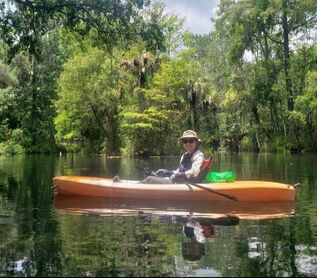
Celeste Lam
Celeste graduated from UNC Charlotte with a B.Sc. in Psychology and an MA in Anthropology in May 2022. In 2018 she interned at the Yerkes National Primate Research facility where her love for primate behavior was cemented. She later completed the Maderas Rainforest Conservancy field school where she learned primatological field methods. Through her field and captive experiences, she gained the skills necessary for her MA research. Celeste's MA thesis research focused on patterns of aggression in response to river tourism at Silver Springs State Park. She is also interested in mother-infant relationships, infant development, cross-species aggression, and community ecology specifically in the context of habituation, the spread of human activity, and climate change. With these research interests, she plans to obtain a Ph.D. in Biological Anthropology with a focus on primatology and community ecology.
Celeste is currently a PhD student at Tulane University.
Celeste graduated from UNC Charlotte with a B.Sc. in Psychology and an MA in Anthropology in May 2022. In 2018 she interned at the Yerkes National Primate Research facility where her love for primate behavior was cemented. She later completed the Maderas Rainforest Conservancy field school where she learned primatological field methods. Through her field and captive experiences, she gained the skills necessary for her MA research. Celeste's MA thesis research focused on patterns of aggression in response to river tourism at Silver Springs State Park. She is also interested in mother-infant relationships, infant development, cross-species aggression, and community ecology specifically in the context of habituation, the spread of human activity, and climate change. With these research interests, she plans to obtain a Ph.D. in Biological Anthropology with a focus on primatology and community ecology.
Celeste is currently a PhD student at Tulane University.
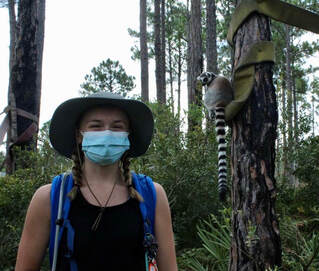
Abby Richardson
Abby graduated from UNC Charlotte in May 2021 with a Bachelor's degree in Biology and was already enrolled in our Early Entry MA program in Anthropology which she completed in May 2022. Her MA thesis research investigated the influences of environmental/external variables on the activity patterns of three species of semi-free ranging lemur at the Lemur Conservation Foundation's Myakka City lemur reserve. Overall, she is interested in primate interactions with their environment and how ecological research can be applied to various conservation initiatives. Her first field experience (and the reason why she decided to join the program) was with Dr. Light's Primate Behavioral Ecology field course in March 2020 and she later served as the TA for the course in March 2022.
Abby currently works at the Center for Biodiversity Studies at Reedy Creek Nature Center.
Abby graduated from UNC Charlotte in May 2021 with a Bachelor's degree in Biology and was already enrolled in our Early Entry MA program in Anthropology which she completed in May 2022. Her MA thesis research investigated the influences of environmental/external variables on the activity patterns of three species of semi-free ranging lemur at the Lemur Conservation Foundation's Myakka City lemur reserve. Overall, she is interested in primate interactions with their environment and how ecological research can be applied to various conservation initiatives. Her first field experience (and the reason why she decided to join the program) was with Dr. Light's Primate Behavioral Ecology field course in March 2020 and she later served as the TA for the course in March 2022.
Abby currently works at the Center for Biodiversity Studies at Reedy Creek Nature Center.

Ethan Gulledge
Ethan received their BA in Applied Anthropology from UNC Charlotte in 2022 and continued here at UNC Charlotte to receive their MA in Anthropology in 2023. Their MA research focused on ring-tailed lemur foraging behavior and they gained their first primatology field experience at the Lemur Conservation Foundation during the summer of 2022. Eventually, they would like to earn a Ph.D. and teach anthropology at the university level.
Ethan is now an adjunct instructor for the UNC Charlotte Anthropology Department.
Ethan received their BA in Applied Anthropology from UNC Charlotte in 2022 and continued here at UNC Charlotte to receive their MA in Anthropology in 2023. Their MA research focused on ring-tailed lemur foraging behavior and they gained their first primatology field experience at the Lemur Conservation Foundation during the summer of 2022. Eventually, they would like to earn a Ph.D. and teach anthropology at the university level.
Ethan is now an adjunct instructor for the UNC Charlotte Anthropology Department.
Want to join the lab? I am always looking for hard-working researchers to join the lab. If you are an undergraduate at UNC Charlotte, please email me and we can discuss ways you can get involved. If you are looking to join our MA program, please email me and send me your CV and a short statement about your research interests. You can also learn more about our MA program and apply here.